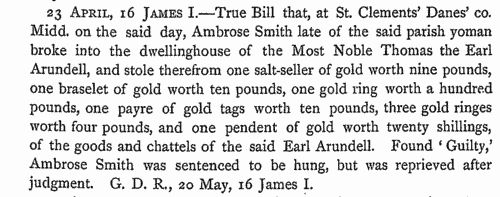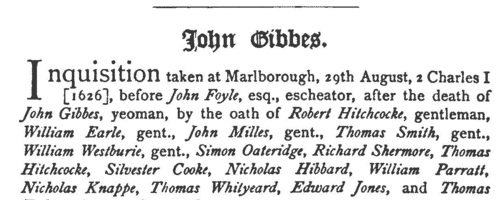Boston Surname Ancestry ResultsOur indexes 1000-1999 include entries for the spelling 'boston'. In the period you have requested, we have the following 310 records (displaying 41 to 50): Single Surname Subscription | | | Buying all 310 results of this search individually would cost £1,782.00. But you can have free access to all 310 records for a year, to view, to save and print, for £100. Save £1,682.00. More... |
These sample scans are from the original record. You will get scans of the full pages or articles where the surname you searched for has been found. Your web browser may prevent the sample windows from opening; in this case please change your browser settings to allow pop-up windows from this site. London Marriage Allegations
(1521-1610)
London, Essex and part of Hertfordshire lay within the diocese of London. In the later 17th century the individual archdeaconry courts issued marriage licences, but for this period the only surviving material is from the overarching London Consistory court. The main series of marriage allegations from the consistory court starts 7 December 1597, and these were extracted by Colonel Joseph Lemuel Chester; Colonel Chester then discovered earlier material, back to 5 January 1521, in Vicar-General's Books of the Principal Probate Registry. The notices in these books were much briefer, but as well as extending back so much earlier, they included additional material for 1597 onwards. All this he collated with the consistory court extracts, and the text was edited by George J. Armytage and published by the Harleian Society in 1887. A typical later entry will give date; name, address and occupation of groom; name, address and condition of his intended bride, and/or, where she is a spinster, her father's name, address and occupation. Lastly we have the name of the church where the wedding was going to take place; or the words Gen. Lic. signifying a general or open licence.BOSTON. Cost: £4.00.  | Sample scan, click to enlarge

| Worcestershire Quarter Sessions
(1615)
J W Willis Bund compiled this abstract of surviving records from the Worcestershire quarter session rolls for the Records and Charities Committee of the Worcestershire County Council. This text, extending as far as 1621, was published in 1899: the entries are arranged by year under the headings Recognizances, Indictments, and Miscellaneous. BOSTON. Cost: £4.00.  | Sample scan, click to enlarge

| Middlesex Sessions
(1603-1625)
Incidents from the Middlesex Sessions Books. These are abstracts of sessional orders, minutes of criminal cases, memoranda and other entries of record taken from the three volumes of Gaol Delivery Register, four volumes of Sessions of Peace Register and two volumes of Process Books of Indictments for the county of Middlesex from the reign of king James I. The references at the end of each item indicate the volume in question, the abbreviations being G. D. for Gaol Delivery, S. P. for Sessions of Peace, and S. O. T. for Session of Oyer and Terminer; occasionally preceded by S. for Special or G. for general, or followed by R. for Roll or Reg. for Register. It should be noted that, in the case of 'true bills' or indictments, the abstract starts with the date on which the offence took place, the date of the conviction &c. being at the end of the entry.BOSTON. Cost: £4.00.  | Sample scan, click to enlarge

| Inhabitants of Cambridge
(1504-1635)
Cambridge comprised fourteen ancient parishes, plus the university (which was extra-parochial), in the diocese of Ely. The church of St Mary the Great (as opposed to St Mary the Less) in the Market Place (juxta forum) has churchwardens' accounts surviving from 1504 onwards. Those from 1504 to 1635 were transcribed by J. E. Foster for the Cambridge Antiquarian Society and published in 1905. The two churchwardens were chosen annually: the previous year's churchwardens each chose another parishioner: those two then each chose three other parishioners: the resulting eight then chose the new year's churchwardens, the wardens of the Light of the Rood, and the wardens of the Mass of Jesus. Auditors were also chosen, usually out of the eight, to examine all the wardens' accounts at the end of the year. The churchwardens' accounts are largely concerned with the costs of repair of the church and its furnishings, and include the names of tradesmen and workmen. Each Easter a rate called Easter money was raised was raised from all householders in the parish, and additional rates are occasionally levied for unusual expenses, such as steeple reconstruction. These 'Easter book' lists give a complete list of householders for the parish, excepting the poor. The church's income also included the rents from some houses in the parish, and the names of the tenants appear. The offices of the Light of the Rood and the Mass of Jesus were abolished during the Reformation. The accounts of the Light of the Rood, i. e., for candles burnt before the crucifix, often include a list of sums received for funerary diriges (dirges) for the year, from which the year of death of the more prosperous parishioners can be traced in this early period. BOSTON. Cost: £4.00.  | Sample scan, click to enlarge

| Immorality and heresy in Northumberland and Durham
(1626-1638)
Sexual and religious behaviour, marriage and probate were under the purview of the ecclesiastical courts in England at this period, exercised through the individual dioceses and archdeaconries. The diocese of Durham included the whole of county Durham, Northumberland (except for Hexhamshire) and Alston in Cumberland. The High Commission Court dealt with cases from the whole diocese, and a book of court acts from 1628 to 1639, and another of depositions from 1626 to 1638, survived in the dean and chapter library, were edited by W. Hylton Dyer Longstaffe, and published by the Surtees Society in 1858. This is not a complete abstract of the record: there are hundreds of cases for contempt of the ordinary jurisdiction, of which only a few were selected as examples 'in consequence of the rank of the persons proceeded against or other contents of interest'. However, all cases in which the nature of the offence occurs are traced from start to finish, but omitting much of the proceedings in between. The names and ages of all the deponents are recorded. BOSTON. Cost: £4.00.  | Sample scan, click to enlarge

| Wiltshire freeholders
(1625-1645)
Inquisitions post mortem were held after the death of freeholders who held their estates in capite or in chief, i. e., directly from the crown. The inquisition, held by the royal escheator upon the oath of jurors from the county who were also normally freeholders, recorded what estates the deceased had held, by what tenure, what they were worth, the date of death, who was the next heir, and whether the heir was of age. The sample scan shows an unusually brief inquisition: these abstracts usually run to two or three pages of print. BOSTON. Cost: £4.00.  | Sample scan, click to enlarge

| Surrey Sessions
(1661-1663)
Surrey Sessions Rolls and Order Books. These are abstracts of sessional orders, minutes of criminal cases, memoranda and other entries of record taken from the Order Books from October 1661 to January 1663, inclusive, and the Sessions Rolls for October 1661, January 1662, April 1662, July 1662, October 1662 and January 1663.BOSTON. Cost: £4.00.  | Sample scan, click to enlarge

| Official Papers
(1671)
The State Papers Domestic cover all manner of business relating to Britain, Ireland and the colonies, conducted in the office of the Secretary of State as well as other miscellaneous records. Includes lists of passes to travel abroad.
BOSTON. Cost: £4.00.  | Sample scan, click to enlarge

| Suffolk householders
(1674)
Hearth tax was raised by assessing each householder on the number of chimneys to the dwelling. This provided a simple way to make a rough judgment as to the value of the dwelling: paupers were issued exemption certificates, but they too were listed at the end of each return. The returns were made by township, grouped by hundred. A complete copy of the hearth tax return for each shire was sent to the Exchequer: this is the return for Suffolk for Lady Day (25 March) 1674 (E 179/257/14) as printed in 1905 as Suffolk Green Book no xi, vol. 13. The numbers given are the numbers of hearths: where two or more people are grouped together with one number, it may be assumed that they were heads of separate households sharing a single building with that number of chimneys.BOSTON. Cost: £6.00.  | Sample scan, click to enlarge

| Allegations for marriages in southern England
(1679-1687)
The province or archbishopric of Canterbury covered all England and Wales except for the northern counties in the four dioceses of the archbishopric of York (York, Durham, Chester and Carlisle). Marriage licences were generally issued by the local dioceses, but above them was the jurisdiction of the archbishop, exercised through his vicar-general. Where the prospective bride and groom were from different dioceses it would be expected that they obtain a licence from the archbishop; in practice, the archbishop residing at Lambeth, and the actual offices of the province being in London, which was itself split into myriad ecclesiastical jurisdictions, and spilled into adjoining dioceses, this facility was particularly resorted to by couples from London and the home counties, although there are quite a few entries referring to parties from further afield. The abstracts of the allegations given here usually state name, address (street in London, or parish), age, and condition of bride and groom; and sometimes the name, address and occupation of the friend or relative filing the occupation. Where parental consent was necessary, a mother's or father's name may be given. The ages shown should be treated with caution; ages above 21 tended to be reduced, doubtless for cosmetic reasons; ages under 21 tended to be increased, particularly to avoid requiring parental consent; a simple statement 'aged 21' may merely mean 'of full age' and indicate any age from 21 upwards. These are merely allegations to obtain licences; although nearly all will have resulted in the issuing of the licence, many licences did not then result in marriage. BOSTON. Cost: £4.00.  | Sample scan, click to enlarge

|
Research your ancestry, family history, genealogy and one-name study by direct access to original records and archives indexed by surname.
|












